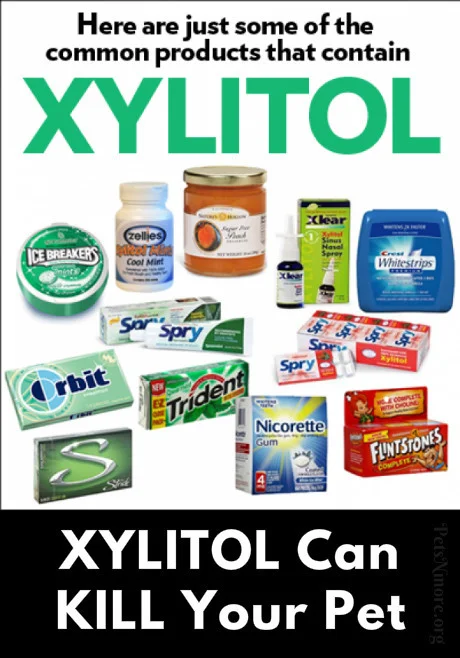Chocolate is a good example. Delicious for people but dogs are unable to metabolize an ingredient in chocolate that acts like a stimulant and can cause hyperactivity, seizures and death in dogs
But lately, Xylitol toxicity in dogs is becoming more common and is far more dangerous than chocolate.
The Pet Poison Helpline has been working to identify products with xylitol as an ingredient.
Besides having a sweet flavor, Xylitol will hold moisture in a food product to keep it soft and spreadable and therefore may be found in products that you would not expect to have an artificial sweetener.
Below are some of the symptoms associated with xylitol poisoning:
But lately, Xylitol toxicity in dogs is becoming more common and is far more dangerous than chocolate.
Xylitol is a sugar substitute commonly used in:
- toothpastes
- mouthwash
- sugarless gum
- certain cough medicines
- children's chewable multi-vitamins
- variety of nut butters (such as peanut butter, sunflower butter; check the brand ingredients before feeding to pets)
- baked goods and candies
This product is recommended for diabetics (humans) and those following a low-carbohydrate diet.
However, xylitol is extremely dangerous to your dog.
Other Products with Xylitol
The Pet Poison Helpline has been working to identify products with xylitol as an ingredient.
According to Ahna Brutlag, assistant director of veterinary services, these are some products to keep out of reach of pets:
- Rx suspensions/melts (i.e. Neurontin®, Abilify®, Allegra®, Mobic®, RioMet®, clonazepam, Emtrivia®)
- OTC liquid medications
- OTC digestive aids (Beano®, antacids)
- Dental/oral care products
- Nasal sprays
- Nicotine gum
- Chewable dietary supplements
- Stool softeners
- Barium liquid and pudding
- Ice cream
- Jell-O® sugar free pudding
- Energy drinks
- Peanut butter and other nut butters
In 2011, the FDA issued a consumer alert about the dangers of xylitol ingestion in certain animals, particularly dogs. The effects are still unknown in cats.
RELATED: Xylitol: Safe or Dangerous?
(For Humans)
Besides having a sweet flavor, Xylitol will hold moisture in a food product to keep it soft and spreadable and therefore may be found in products that you would not expect to have an artificial sweetener.
Xylitol may be listed on product labels under other names such as Eutrit, Kannit, Newtrol, Xylite, Torch or Xyliton. Some manufacturers may place a warning label on their product, but most do not.
Even in tiny amounts, Xylitol is deadly to dogs. A single stick of sugar-free gum can be toxic to a 20-pound dog.
In people, Xylitol is absorbed slowly and has little to no effect on blood sugar or insulin levels. However, dogs absorb Xylitol quickly, usually within 30 minutes. Xylitol causes a strong insulin release, resulting in profound hypoglycemia. If the blood sugar drops too low, the dog will die.
In addition to causing low blood sugar, Xylitol may cause severe liver damage in some dogs. This can result in bleeding, liver failure and death.
Vomiting is most often the first symptom. Lethargy and weakness are signs of hypoglycemia and may occur rapidly. However, some dogs may have delayed hypoglycemia for as long as 12 hours.
Even in tiny amounts, Xylitol is deadly to dogs. A single stick of sugar-free gum can be toxic to a 20-pound dog.
In people, Xylitol is absorbed slowly and has little to no effect on blood sugar or insulin levels. However, dogs absorb Xylitol quickly, usually within 30 minutes. Xylitol causes a strong insulin release, resulting in profound hypoglycemia. If the blood sugar drops too low, the dog will die.
In addition to causing low blood sugar, Xylitol may cause severe liver damage in some dogs. This can result in bleeding, liver failure and death.
Vomiting is most often the first symptom. Lethargy and weakness are signs of hypoglycemia and may occur rapidly. However, some dogs may have delayed hypoglycemia for as long as 12 hours.
Below are some of the symptoms associated with xylitol poisoning:
- Vomiting
- Diarrhea
- Weakness
- Ataxia (uncoordinated movements)
- Depression
- Decreased potassium
- Seizures
- Coma
There is no antidote for Xylitol toxicity.
Pets that develop neurologic signs such as seizure and coma will have a poor to grave prognosis. All Xylitol exposures should be immediately evaluated by a veterinarian!

Because Xylitol is absorbed rapidly, early intervention will result in the best prognosis.
Remember to bring the packaging or wrapper of the product your pet ingested if possible. It may be helpful in determining the amount of Xylitol your pet has ingested.
Please spread this important information to your fellow pet owners:
1. Xylitol is deadly to dogs, even in tiny amounts.
2. Xylitol is an artificial sweetener but is found in all kinds of foods not associated with sweet taste. (Xylitol may be listed under different names.)
3. Xylitol toxicity involves rapid hypoglycemia and liver damage.
4. Early intervention is crucial with Xylitol exposure.
Always remember that our food is not meant for our pets.
Pets that develop neurologic signs such as seizure and coma will have a poor to grave prognosis. All Xylitol exposures should be immediately evaluated by a veterinarian!
RELATED: LIST OF FOODS TO AVOID GIVING TO

Because Xylitol is absorbed rapidly, early intervention will result in the best prognosis.
Remember to bring the packaging or wrapper of the product your pet ingested if possible. It may be helpful in determining the amount of Xylitol your pet has ingested.
1. Xylitol is deadly to dogs, even in tiny amounts.
2. Xylitol is an artificial sweetener but is found in all kinds of foods not associated with sweet taste. (Xylitol may be listed under different names.)
3. Xylitol toxicity involves rapid hypoglycemia and liver damage.
4. Early intervention is crucial with Xylitol exposure.
Prevent Xylitol Poisoning
Always remember that our food is not meant for our pets.
If you don’t know the ingredients of a specific food, don’t feed it to your pet. If you often purchase gum and food labeled “sugar free,” be sure not to leave it out where your pet can access it. Following common sense safety with your food items could save you pet — and you — much suffering.
NOTE: Sugar substitutes are "sugar alcohols" which are commonly found in foods which are also called sorbitol, mannitol, xylitol, isomalt, and hydrogenated starch hydrolysates on the labels. I would never purchase any item that contains these words. YOU be the judge...
NOTE: Sugar substitutes are "sugar alcohols" which are commonly found in foods which are also called sorbitol, mannitol, xylitol, isomalt, and hydrogenated starch hydrolysates on the labels. I would never purchase any item that contains these words. YOU be the judge...
And don't forget to always read the labels...
Better Safe Than Sorry!



